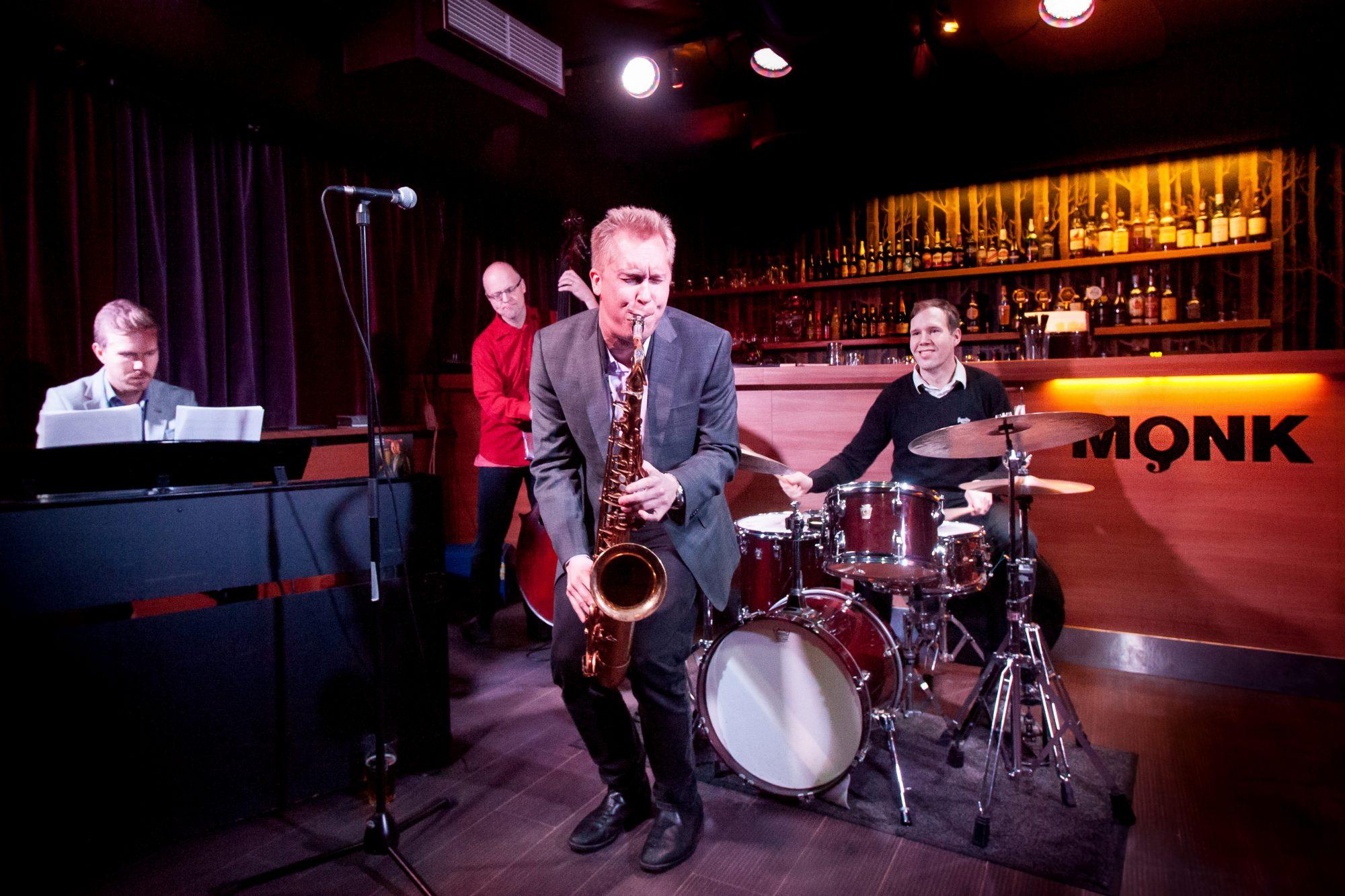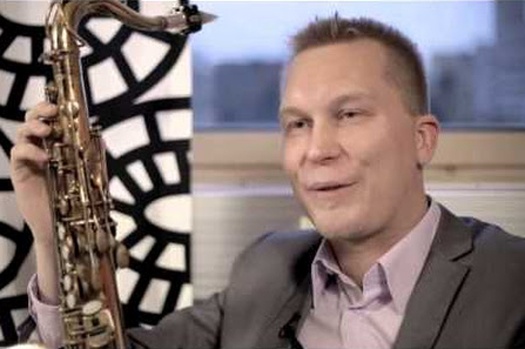Jazz interview with jazz saxophonist William Suvanne. An interview by email in writing.
JazzBluesNews.Space: – First let’s start with where you grew up, and what got you interested in music?
William Suvanne: – I grew up in a small city called Imatra just becide the border of Russia, eastern Finland. I got interested in music little by little. By coincidence, I startet playing the clarinet in a music school (it was random picked instrument) and later I joined the Junior Big Band.
JBN.S: – What got you interested in picking up the saxophon? What teacher or teachers helped you progress to the level of playing you have today? What made you choose the saxophon?
WS: – I played the clarinet since the age of ten. Obviously after I joined the Junior Big Band in the age of 12, I wanted to play the sax. However, I got one in the age of 15. Of course I had many teachers, but I have to say I learned the most by jamming with friends and listening to great players. A very big year for me as a sax player was 2004, when I was an exchange student in Groningen, Netherlands. That year I just went to jam sessions and practised. I also composed my first album “Indian Curry” there, in the Netherlands.
JBN.S: – How did your sound evolve over time? What did you do to find and develop your sound?
WS: – I’ve always focused more to the fact that the playing feels good: I’ve never blown a tone that sounded bad, when I have felt good overall. As a young sax player I had huge problems with playing the overtones, so I practised those. That built me a good ground to the sound. I’ve always known how I want to sound, or should I say, how I want the playing to feel. I started to play the tenor in the age of maybe 24, but nowdays (currently 38) I play the tenor a little more than the alto. Of course the mouthpieces mean a lot to the sound. I use Guardala MB 2 in tenor and with alto a vintage Meyer New York 6. The instruments I play are a 1958 Mark VI alto and a transistional, half SBA, half Mark VI tenor.
JBN.S: – What practice routine or exercise have you developed to maintain and improve your current musical ability especially pertaining to rhythm?
WS: – I try to practise as much as possible with the metronome. I try to get a single note to groove like I was a percussionist. Hmm, this is a tricky one… I quess I constantly go over and over rythms and songs during daily life.
JBN.S: – Which harmonies and harmonic patterns do you prefer now? You’re playing is very sensitive, deft, it’s smooth, and I’d say you drift more toward harmony than dissonance. There is some dissonance there, but you use it judiciously. Is that a conscious decision or again, is it just an output of what goes in?
WS: – Hm… I have checked out Cannonball Adderley and Michael Brecker, so propably they have influenced my playing somehow, hopefully. Maybe I go more toward harmony than dissonance, but it really depends how I feel like at a perticular moment and whom I’m playing with. During the last weeks I’ve been practising to play augmented a whole step down from a minor chord. So, when Gm7, you play “F” augmented…how cool is that?!
JBN.S: – How to prevent disparate influences from coloring what you’re doing?
WS: – I guess that is impossible. History of jazz lives in every player. If Charlie Parker never lived, I would propably sound different than I do today.
JBN.S: – What do you love most about your new album 2018: <Chess’n Jazz>, how it was formed and what you are working on today.
WS: – Chess´n Jazz is combining my two passions, jazz music and the game chess. The compositions are stories about the game; tunes for the chess pieces or statuses in the game. I’m so happy I got all the great players to the project Chess´n Jazz. The band is the same as in my previous album “the Tenor”, completed by Varre Vartiainen on guitar. Thoug the idea, compositions and planning the concerts has taking a lot of work we recorded the album in two days. I’m very proud of the album. At the moment I’m touring with the Chess’n Jazz in Finland, we’ve had 14 gigs during the last month. My plan is to start composing tunes for a new album soon.
JBN.S: – What’s the balance in music between intellect and soul?
WS: – I think when improvising together it is kind of “conversationes of the subconciousnessies”. There’s definitely a bit of magic when music touches you. I would say one can´t teach to play energeticly or soulfully. Those are qualities of a person. Most of the music can be taught, but the soul-part not.
JBN.S: – There’s a two-way relationship between audience and artist; you’re okay with giving the people what they want?
WS: – Like my friend Derek Brown (the beatboxsaxguy) said, “There’s two kinds of music: good and bad. And I like them both!” When I play jazz-gigs, I only play it for myself but yes sometimes we all play gigs where you give people what they want. I’m completely okay with both of them.
JBN.S: – Please any memories from gigs, jams, open acts and studio sessions which you’d like to share with us?
WS: – As a youg sax player I was in a jam session in Groningen, Netherlands and I got a chance to play with Rick Margitza. I was so nervous I could barely breath. Obviously the Confirmation we played did not come up too good. However, after that I’ve never been too nervous anymore. I guess I thought: I have already hit rock bottom.
JBN.S: – How can we get young people interested in jazz when most of the standard tunes are half a century old?
WS: – I think there will come a response sooner or later to this turbosoundmusic we hear from the radio these days. Jazz will find some new reforms. Check out “Julkinen Sana” from Finland, it’s a big band with 3 rappers. We need these kinds of innovations to get people closer to jazz, and to get interested in all kind of jazz.
JBN.S: – John Coltrane said that music was his spirit. How do you understand the spirit and the meaning of life?
WS: – When you truly play, improvise, you can really forget everything surrounding. And beyond, when the only thing existing to the player is the music there and then, there’s something holy in it. So I guess somehow I understand Coltraine.
JBN.S: – If you could change one thing in the musical world and it would become a reality, what would that be?
WS: – To let all the people hear music like musicians do: separate the instruments, understand harmonies and grooves. That would be the end of the lack of audience in concerts.
JBN.S: – Who do you find yourself listening to these days?
WS: – Just listened some Bob Berg albums on tour of ours. Man was he a cat! Also a few days ago I listened the whole live concert of Chick Corea’s Return to Forever. I listen all kind of music, not just jazz.
JBN.S: – Let’s take a trip with a time machine, so where and why would you really wanna go?
WS: – Hmm, another difficult one! Could go to many times and places on the 50ths 60ths and 70ths but maybe I’d go to year 1981 to listen live the Jaco Pastorius birthday concert.
JBN.S: – I have been asking you so far, now may I have a question from yourself…
WS: – Alto or Tenor? Argh! This is the trickiest one. Both.
JBN.S: – Thank you for answers. I like the tenor sound the most …
JBN.S: – So putting that all together, how are you able to harness that now?
WS: – Greetings to everybody!
Interview by Simon Sargsyan







More Stories
Interview with Janis Siegel of The Manhattan Transfer: Jazz, being a more refined, interpreted form of music
CD review: George Benson – Dreams Do Come True: When George Benson Meets Robert Farnon – 2024: Video, CD cover
The band was tight as ever. The Warren Haynes Band cuts loose: Video, Photos